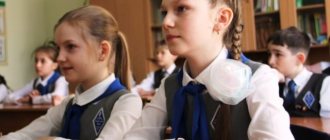What does the concept of “child’s readiness for school” mean?
Represent your child's readiness for school in the form of a flower. In order for it to bloom, strong roots are needed. Roots are a good level of development of memory, attention, imagination, logical thinking, and strong-willed qualities. Soil is the environment in which the baby develops. The flower receives nutrition through the leaves - the level of mental development and the level of self-regulation. These two components are simply of great importance for the successful assimilation of educational material.
Quite often we encounter parents whose children cannot concentrate on school assignments and are unable to listen to the teacher. Mothers note: at the beginning of the school year, the baby happily went to school, but after a while the desire to learn disappeared. The child became lethargic, sickly, or, conversely, turned into a little despot and brawler. And even if previously a first-grader could read well enough, academic performance overall was significantly reduced compared to children less prepared for school.
Being ready for school does not mean being able to read, write and do math. Being ready for school means being ready to learn it all.
Child psychologists identify several criteria for a child’s readiness for school.
Physical readiness.
Studying at school is associated with great physical and psychological stress. By filling out your child’s medical record before entering school, you can easily navigate this issue and get advice from medical specialists. If your child has serious health problems and special forms of education or a special school are recommended to you, do not neglect the advice of doctors.
Intellectual readiness.
It includes the child’s knowledge base, the presence of special skills and abilities (the ability to compare, generalize, reproduce a given sample; the development of fine motor skills; concentration, etc.). Intellectual readiness is not only the ability to read and write, but also the development of speech (the ability to answer a question, ask a question, retell a text), the ability to reason and think logically.
Social readiness.
This is the child’s need to communicate with peers and the ability to subordinate his behavior to the laws of children’s groups, as well as the ability to play the role of a student in a school situation.
Psychological readiness.
From this point of view, a child who is ready for school education is attracted to school not only by its external appearance (wonderful backpack, beautiful student uniform), but also by the opportunity to acquire new knowledge and skills. A child who is ready for school wants to study both because he wants to take a certain position in society, which opens access to the world of adults, and because he has a cognitive need that he cannot satisfy at home.
Consultation for parents of children in the preparatory group of preschool educational institutions. Back to school soon
Presentation for parents of children of the preparatory group “Soon to school”
Prepared by: Topolnikova N.V., teacher of GBDOU kindergarten No. 14, St. Petersburg
This is the end of our children’s last year in kindergarten. The stage of development called preschool childhood ends. Soon the school will open its doors to the children, and a new period in their lives will begin. They will become first-graders, and you, dear mothers and fathers, will “sit down” at their desks with them.
Being ready for school does not mean being able to count, write and read. Being ready for school means being ready to learn it all. The beginning of school is a new stage in the life of a child (and parents too), which, of course, requires a certain level of readiness for this qualitatively new stage in life and a completely new type of activity - educational.
Often, readiness to learn only means a certain level of knowledge, skills and abilities of a child, which of course is also important. The most important thing when moving to a qualitatively new level is psychological readiness for learning activities. And, above all, the formation of the desire to learn (motivational readiness).
But that's not all. There is a huge gap between “I want to go to school” and “I need to learn to work”; without realizing this “need”, a child will not be able to study well, even if before school he can read, write, count well, and so on. When preparing a child for school, it is necessary to teach him to listen, see, observe, remember, and process the information received.
Readiness criteria: Physical Intellectual Social Motivational
Physical readiness is a level of development of all body systems at which daily training loads do not harm the child, do not cause him excessive stress and fatigue. Each child has his own, well-defined, adaptive resource, and it is laid down long before the child enters school. When choosing a school and school workload, you need to pay attention to the health group, doctors’ opinions, and the child’s illness.
Intellectual readiness includes the child’s knowledge base, the presence of special skills and abilities. Mental skills can also be expressed in the ability to read and count. However, a child who reads and even knows how to write is not necessarily well prepared for school. It is much more important to teach a preschooler competent retelling, the ability to reason and think logically.
Social readiness is the child’s attitude to work and cooperate with other people, in particular adults who have taken on the role of teacher-mentors. Having this component of readiness, a child can be attentive for 30-40 minutes and can work in a team. Having become accustomed to certain requirements and the manner of communication of teachers, children begin to demonstrate higher and more stable learning results.
Motivational readiness—implies a reasonable desire to go to school. In psychology, there are different motives for a child’s readiness for school: playful, cognitive, social. Game room: There are a lot of guys there, and you can play with them; Cognitive: learn something new, interesting; Social: acquire a new social status (become a schoolchild, have a briefcase, textbooks, a workplace).
WHAT A CHILD ENTERING SCHOOL NEEDS TO KNOW AND BE ABLE TO KNOW: 1. Your first name, patronymic and last name 2. Your age (date of birth) 3. Your home address 4. Your city, its main attractions 5. The country in which you live 6. Last name , first name, patronymic of parents, their profession
7. Seasons (sequence, months, main signs of each season, riddles and poems about the seasons) 8. Domestic animals and their cubs 9. Wild animals of our forests, hot countries, the North, their habits, cubs 10. Ground transport, water, air 11. Distinguish between clothes, shoes and hats; wintering and migratory birds; vegetables, fruits and berries 12. Know and be able to tell Russian folk tales
13. Distinguish and correctly name planar geometric figures 14. Freely navigate in space and on a sheet of paper 15. Be able to fully and consistently retell a story heard or read, compose, come up with a story based on a picture 16. Remember and name 6-10 pictures, words 17. Distinguish between vowels and consonants
18. Divide words into syllables according to the number of vowel sounds 19. Good use of scissors (cut strips, squares, circles, rectangles, triangles, ovals, cut out an object along the contour) 20. Use a pencil: draw vertical and horizontal lines without a ruler, draw geometric shapes , animals, people, various objects based on geometric shapes, carefully paint over, shade with a pencil, without going beyond the contours of objects 21. Be able to listen carefully, without distraction (30 - 35 minutes)
22. Freely count to 20 and back, perform counting operations within 10. Correlate the number of objects and numbers. Learn the composition of numbers: 2,3,4,5. Read basic math 23. Maintain good, slender posture, especially when sitting.
Recommendations for parents of future first-graders: Wake your child calmly; when he wakes up, he should see your smile. After school, do not rush to sit down for homework; you need two to three hours of rest to restore strength and attention. Don’t force students to do all their homework in one sitting; after 15-20 minutes of studying, 10-15 minute “breaks” are necessary; it’s better if they are active. While preparing homework, give your child the opportunity to work on his own.
Be attentive to your child's complaints. Help your child master information that will allow him not to get confused in society. Teach your child to keep his things in order. Do not frighten your child with difficulties and failures at school. Teach your child to react correctly to failures.
Help your child gain a sense of self-confidence. Teach your child to be independent. Teach your child to feel and be surprised, encourage his curiosity. Strive to make every moment of communication with your child useful.
References: Ivanova E. Preparing a child for school: practical advice to parents Babaeva T. I. “At the school threshold.” Gutkina N. I. “Psychological readiness for school.” Kovaleva E., Sinitsyna E. “Preparing the child for school.” The world of a preschooler: “Questions and answers” compiled by G. K. Kislitsa and others. Monina G. B., Panasyuk E. V. “Pre-school boom or what parents of a future first-grader need to know.” Nartova S.K., Mukhortova E.A. “Soon to school! Exciting preparation of children for first grade."
We recommend watching:
Raising interest in school in children of the preparatory group Teaching literacy to children 5-6 years old Advice for parents of future first-graders Summary of a comprehensive lesson on preparing children 6-7 years old for school
Similar articles:
Learning the alphabet with preschoolers in kindergarten
Children's perception of information
Fatigue and overwork in preschool children
Educational coloring books for children from 3 to 5 years old
Excursion for preschoolers to school
How do you know if your child is ready to go to school?
School psychologists have developed special methods to determine the level of readiness of a child for school. Seek help from a psychologist working in the kindergarten your child attends.
Try to answer (“yes” or “no”) to the questions in this test. It will help you understand whether your child is ready for school.
1. Can your child do anything independently that requires concentration for 25-30 minutes (for example, assembling construction sets or puzzles)?
2. Does your child say that he wants to go to school because there he will learn a lot of new and interesting things and make new friends?
3. Can your child independently compose a story based on a picture, including at least 5 sentences?
4. Does your child know several poems by heart?
5. Is it true that your child behaves at ease and is not shy in the presence of strangers?
6. Does your child know how to change a noun by numbers (for example: frame - frames, ear - ears, person - people, child - children)?
7. Can your child read syllables without errors or, even better, entire words consisting of 2-3 syllables?
8. Can your child count to twenty and back?
9. Can your child solve addition and subtraction problems within ten?
10. Will your child be able to accurately repeat the sentence (for example: “Bunny, jump on the stump”)?
11. Does your child like to color pictures, draw, or sculpt from plasticine?
12. Does your child know how to use scissors and glue (for example, make applique)?
13. Can your child generalize concepts (for example, name in one word, namely: furniture) table, sofa, chair, armchair)?
14. Can your child compare two objects, that is, name the similarities and differences between them (for example, a pen and a pencil, a tree and a bush)?
15. Does your child know the names of the seasons, months, days of the week, and their sequence?
16. Can your child understand and accurately follow verbal instructions?
If you answered affirmatively to 15-16 questions, you can assume that your child is quite ready for school. It was not in vain that you worked with him, and school difficulties, if they arise, will be easily overcome.
If you answered yes to 9-13 questions, then your child has learned a lot. The content of the questions to which you answered negatively will tell you the topics for further studies.
If you answered affirmatively to 8 (or less) questions, then you should, firstly, read specialized literature, secondly, try to devote more time to activities with your child, and thirdly, seek help from specialists.
I know!
Every child who comes to school for the first time is not a blank slate. Together with a briefcase and an ABC book, a first-grader brings to school a certain amount of knowledge and skills that his parents helped him collect. The child’s readiness for school depends on how large this reserve is.
- Many parents strive to teach their future student mainly reading, writing and arithmetic. But readiness for school is not at all a set of educational skills, but a complex set of various qualities: attention, memory, thinking, imagination, etc. These qualities develop in movement, there is simply no other way. This means that the more a child plays, runs, jumps and tumbles, the easier it will be for him to study at school. This cannot always be done outside, so the task of parents is to create conditions for outdoor games at home.
- An important component of mental development is analytical thinking. Situational games help develop it well. “Mothers and daughters”, “guests”, “school” teach children to understand the main signs and connections between objects and phenomena, to find new sides to familiar things.
- At school, a child will need to retain a large amount of information in memory and then reproduce it. The basis of successful study is the development of logical memorization. Games will help with this too. For example, ask your child to name as many objects in the room as possible. But just so as not to repeat ourselves! Or ask him to find ten differences between the table in the kitchen and in the nursery. If you train your memory a little every day, success in school will not keep you waiting!
- A very important factor in a child’s development is reading books. When a mother or father reads a fairy tale to a baby, his cognitive activity and acuity of perception increases. Ideally, you should devote at least half an hour to this activity every day. It is best if at this time the child is in a relaxed and comfortable position, for example, lying in a crib or hammock.
Not just a child - a student!
Almost all children go to school with joy. It is important that studying itself becomes an enjoyable experience so that disappointment does not arise. And an indispensable condition for this is the child’s social readiness to study at school. It’s not so easy to suddenly turn from a son or daughter into a student!
- In order to successfully adapt to the school community, a child from a very early age needs to be among children, see how others behave, and compare himself with them. Therefore, spend more time with your children in public places and visit them. Let your child’s friends gather with him not only once a year on his birthday, but also come to your house more often. Therefore, it is good if the apartment has conditions for fun children's games.
- Accepting a new social position also means accepting new responsibilities. It is important that even before entering school the child is responsible for something. At home, he can take care of feeding the fish in the aquarium, watering the flowers, helping wash the dishes or put away the toys. Practice shows that if a child had some responsibilities at home, he will be able to switch from an interesting game to less exciting lessons without much difficulty, will not be distracted in class, and will not forget to do his homework when he comes home from school. He will be able to control his behavior sufficiently to fulfill the requirements that the school will set for him.
- Games according to the rules are very useful. It is better if there are several participants who must act in concert. Then the child will quickly learn to act in accordance with elementary requirements that require collective action.
- Let your child be in your place for a little while, “delegate authority.” For example, appoint him “chief in the kitchen”, “responsible for toothpaste”. When going to the store, leave him in charge, let him feel his importance and usefulness for the family. This will be an excellent motivation to complete school assignments and rules of behavior.
Let's train to learn!
To gain new knowledge and skills, listen and remember, analyze and compare, you need a lot of strength. Even just sitting still and not fidgeting can be difficult for children at first. Therefore, the physical development of a child is of particular importance in preparation for school.
- A future schoolchild simply needs daily physical activity. It is almost impossible to force a child to be diligent and attentive - after all, he has so much energy! But if at home you have the opportunity to move actively, then at school it will be easy to sit still and concentrate on the right things.
- At first, a first-grader will need to strain his hand a lot, because the letters will not immediately turn out beautiful and correct. Therefore, exercises that help the development of small arm muscles are very important for a preschooler. This can be drawing, appliqué, shading in various directions. More often, invite boys to make something using simple tools, and girls to embroider or weave macrame. Then mastering the skill of writing will not cause difficulties.
- Studying at school means waking up at the same time every day. It is better if the child gets used to going to bed on time and getting up on time before school. The duration of his sleep should be 10-11 hours. It is important to create optimal conditions for sleep: the temperature in the bedroom should be about 180C, it is better to choose a mattress for a child that is not too soft, but not too hard.
In fact, a child’s entire life from birth is preparation for his first and most important step into adulthood. Therefore, at home it is so important to create all the conditions for the child to develop successfully - intellectually and physically, socially and emotionally. Only then will studying at school become enjoyable and interesting, and good grades will delight students and their parents.



